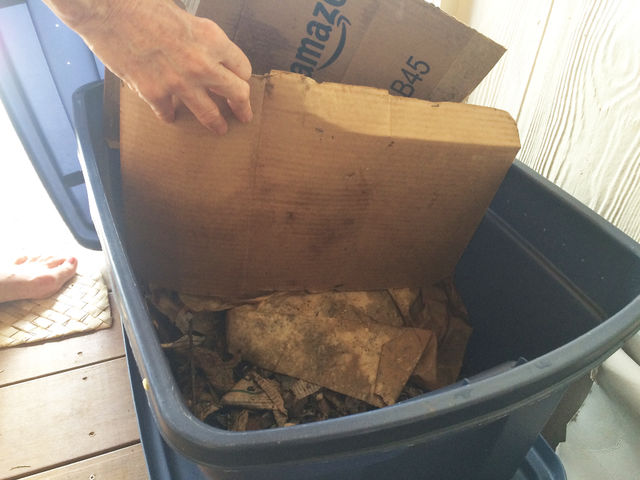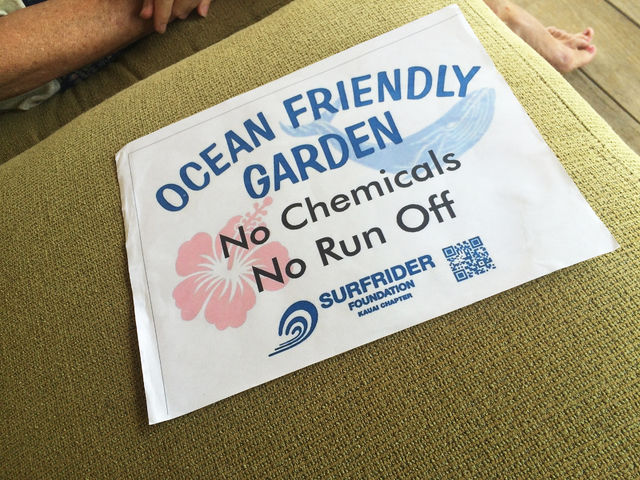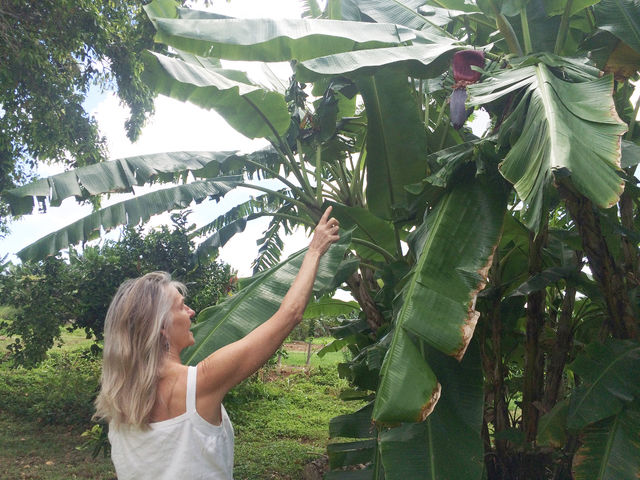WAIMEA — Ocean Friendly Gardens is a new campaign from Surfrider Kauai that isn’t just for people who live right on the coast. Cynthia Welti, who is spearheading the program, said it’s for everyone on Kauai because everyone’s water drains
WAIMEA — Ocean Friendly Gardens is a new campaign from Surfrider Kauai that isn’t just for people who live right on the coast.
Cynthia Welti, who is spearheading the program, said it’s for everyone on Kauai because everyone’s water drains into the ocean.
“We’re on an island, so if water is draining off from your house somewhere, it’s draining off into the ocean and taking whatever is in your garden and on your lawn with it,” Welti said.
The campaign is a way to spread education and awareness about gardening without the use of toxic chemicals and in a way that conserves resources. It was started by the national Surfrider Foundation organization in California to help conserve water during the area’s drought.
Originally, gardens had to use no toxic chemicals and have no runoff. The criteria also required gardens to have no grass, because a lawn requires large amounts of water.
“I revised the criteria for the national Surfrider Foundation’s program, which is what they want everyone to do in their own regions because the conditions are different,” Welti said.
For Kauai, Welti removed the lawn requirement. She is taking a grassroots approach with her own criteria.
“We’re still learning what Ocean Friendly Gardening means on Kauai,” Welti said. “But to start off, we’re looking for no runoff and no toxic chemicals.”
She explained that the runoff qualification really means that the homeowner is taking steps to contain the water that comes from their property on-site.
“Hard surfaces, like concrete, they just flush the water straight out, and we’re wanting people to have spaces where that water can be soaked into the soil instead,” Welti said.
The soil is an “excellent filterer” of whatever happens to be in the water. Surfrider maintains that the soil on-site is the most effective and natural way in most cases to neutralize the water, Welti said.
She suggested placing breaks in sidewalks where the water can seep into the ground as one way to hold onto the runoff from the property.
When it comes to learning how to garden without the use of harsh chemicals, Welti and her husband, Bruce, are experimenting on their own property in Kapahi, where they are currently in a battle with guinea grass.
Their field was originally chock-full of the grass, about 6 feet high, and they had to hire professionals to chop it down to a manageable size. Now they mow the space and are slowly killing the grass with lengths of recycled black plastic tarp.
The couple places the plastic over a stretch of mowed-down guinea grass and leaves it there for a month, secured in place with logs and other debris from their land-clearing project.
“We flip the tarp probably once every 10 days or so to make sure that we don’t gather any mosquitoes in any water that could pool up on there, and to check the spot,” she said.
It’s a combination of lack of oxygen and sunlight that eventually destroys the grass.
“Without light, even guinea grass dies,” Bruce Welti said.
On another section of their land, they are growing sunn hemp — a type of tropical legume that helps with remedying the soil.
The plant is known for reaching 6 feet high in only 60 days after planting, and when it grows it produces large amounts of nitrogen, which is released into the soil when it dies.
It’s these experimental practices that Surfrider Kauai is promoting with its Ocean Friendly Garden campaign.
“We’re by no means experts, but learning is all part of it,” Cynthia Welti said. “With an Ocean Friendly Garden, you get to be a patient detective, watching how your plants react to their environment and working with them to find solutions instead of just using chemicals.”
Homeowners that are endorsed by Surfrider Kauai will get a small, aluminum sign declaring their status. Welti said the organization is currently focusing on residences.
“This program is on all of the main Hawaiian islands, but under different names, and it seems to work best to target residences first instead of things like parks and schools,” she said. “So we’re working with those programs too, in order to share best practices.”
Businesses, county entities and government buildings are welcome to jump on the bandwagon as well.
“If you look at the county building’s landscaping, the way they have it the plants should be able to soak up the water and it doesn’t just drain off right away,” Welti said. “Those are the kinds of things we’re looking for.”




